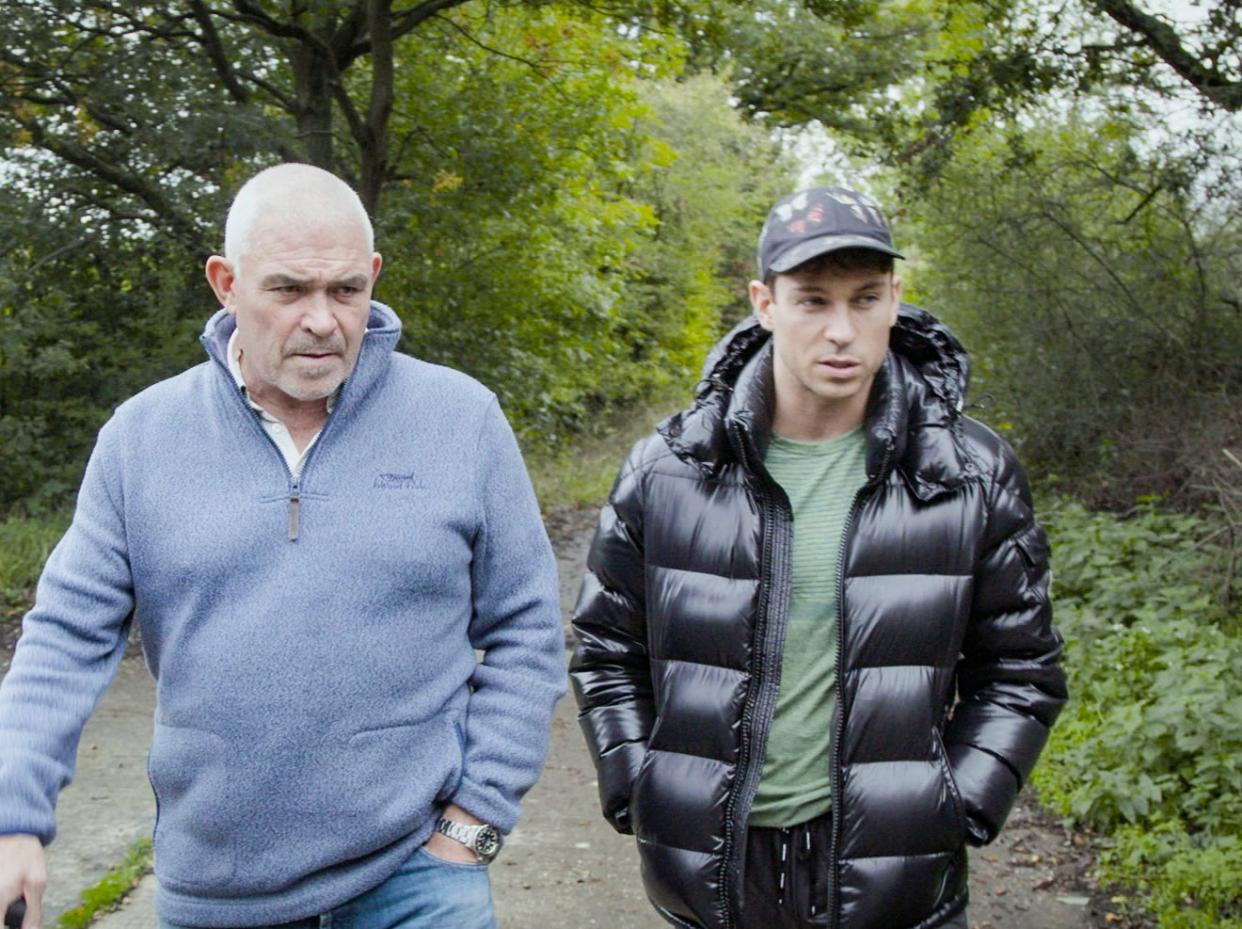Joey Essex: Grief and Me review – The reality star grapples with the trauma of his mother’s suicide

Joey and his dad, Don, walking near his home in Essex and talking about therapy
(BBC/Objective Media)- Oops!Something went wrong.Please try again later.
Maybe it’s the kind of thing we expect from reality TV “stars” these days, but watching Joey Essex “opening up” about the suicide of his mother 20 years ago is a very uncomfortable experience. It’s just not easy, and certainly not entertaining, to watch a man struggle with grief, breaking down in therapy and admitting that, at the age of 30, “I don’t really know who I am”. You’re torn because Joey has invited you to see him cope with his long-term trauma, in the hope that it might help others who’ve been through such a thing – but it still feels a bit voyeuristic, invasive and unkind. Surely our natural instinct is to turn away when we see someone weep, and to grant them their privacy, rather than gawp at them on screen, even if they’ve asked us to do precisely that.
As someone who has spent maybe less time than he ought watching shows such as The Only Way is Essex, Celebs Go Dating and Just Tattoo of Us, I actually don’t really know who Joey Essex is – but I’m not sure I’ve learnt all that much about him by the time the documentary has finished with him. We can see he is wealthy, he has a big house with a swimming pool and garden made to look like the set of Love Island, has lots of material possessions and seems blessed with nice friends and a supportive, close family. He and we can see that when he lost his mum at 10, he sort of blanked her out, because it was all so painful and traumatic, and he kept it that way. The cruellest thing for him at school was just to hear the phrase “your mum”.
So well into his twenties, after he found fame and fortune, he had no pictures of her up in his house, and still didn’t speak of her. That, he speculated, was why he had found it so difficult to form lasting relationships, and had the habit of “spending money and getting rid of it”. Racing around night clubs, doing Towie and “acting the clown” was a way of filling the void left by his mother. For virtually his entire life, he couldn’t understand why “she loved me, she left me”.
He keeps referring to the “pain” she was in, though it is never defined – and I’m not sure it could be, or needed to be. The truth is that no one will ever know why Tina left Joey and the rest of her family, and accepting that fact seems the most difficult, indeed impossible, thing for her little boy. The lesson, unspoken in the programme, is that sometimes what we call “closure” is just impossible – there’s no cure for grief. So far as he can, Joey works really hard at trying to do so, persevering with his therapist, a gentle man by the name of Blumenthal, even as he tells him that he doesn’t actually trust him.
Dr Blumenthal remarks that Joey “has massive issues with trust”, but we don’t get the full psychological read out. The nearest is an analysis of a dream Joey recently had about being with his mum as a kid and then looking up to see that she’d disappeared. This, it would seem, is his subconscious processing the experience, common enough in the bereaved, though not at a distance of two decades on.
By the end of the show, if that’s the right word for it, Joey has made it through eight weeks of psychoanalysis and is feeling better. He’s even able to settle down on the sofa with his nan and sister to watch the old home movies of holidays and birthdays with his mum, which he’s never been able to bring himself to look at as an adult. It is a sort-of-happy, sort-of-ending to a painful journey. “Reality” doesn’t get more real than what Joey has been through.
You can find helpful tips on how to start a conversation, or if you are worried about someone else, on Samaritans website. You can contact the Samaritans helpline by calling 116 123. The helpline is free and open 24 hours a day every day of the year. You can also contact Samaritans by emailing jo@samaritans.org. The average response time is 24 hours.
Read More
Anne Boleyn, review: Jodie Turner-Smith is suitably arch in this very silly historical drama
Mare of Easttown review, episode 7: Sacrament is the ending this exceptional series deserves
Breeders, season two review: An angry parenting comedy somewhere between amusing and bemusing

